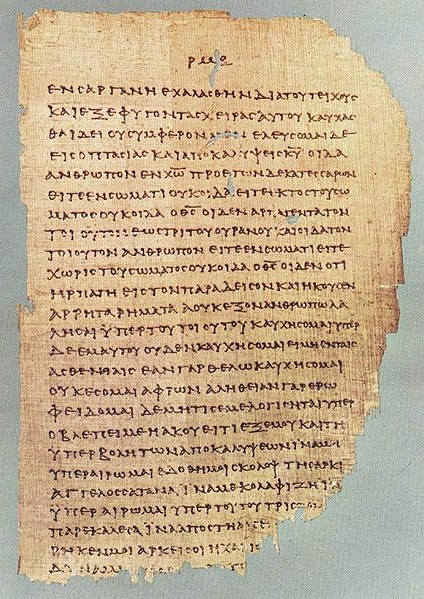文件:P46.jpg

Ê̤ṳ-lāng chék-cháung:424 × 599 chiông-só. Gì-tă hŭng-biêng-lŭk: 170 × 240 chiông-só | 580 × 819 chiông-só.
Nguòng-dā̤ gì ùng-giông (580 × 819 chiông-só, ùng-giông duâi-nâung: 100 KB,MIME lôi-hìng: image/jpeg)
Ùng-giông lĭk-sṳ̄
Sōng-dĕk siŏh bĭk nĭk-gĭ/sì-găng lì káng hiā sèng-hâiu gì ùng-giông.
| Nĭk-gĭ/Sì-găng | Sáuk-liŏk-dù | Chióh-cháung | Ê̤ṳng-hô | Suók-mìng | |
|---|---|---|---|---|---|
| hiêng-káik-sì | 2006 nièng 3 nguŏk 4 hô̤ (B6) 17:25 |  | 580 × 819(100 KB) | Heycos~commonswiki | Folio from Papyrus 46, containing 2 Corinthians 11:33-12:9 |
Lièng-giék
Â-dā̤ gì hiĕk-miêng lièng gáu ciā ùng-giông:
- Bī-dáik, Cièng Cṳ̆
- Bī-dáik, Hâiu Cṳ̆
- Gă-lăk-tái Cṳ̆
- Gŏ̤-lìng-dŏ̤, Cièng Cṳ̆
- Gŏ̤-lìng-dŏ̤, Hâiu Cṳ̆
- Gŏ̤-lò̤-să̤ Cṳ̆
- Hĭ-báik-lài Cṳ̆
- Iók-hâng, Nê Cṳ̆
- Iók-hâng, Săng Cṳ̆
- Iók-hâng, Ék Cṳ̆
- Iók-hâng Hók Ĭng
- Iù-dâi Cṳ̆
- Lò̤-mā Cṳ̆
- Lô-gă Hók Ĭng
- Mā-kō̤ Hók Ĭng
- Mā-tái Hók Ĭng
- Mĕk-sê Liŏh
- Ngā-gáuk Cṳ̆
- Pì-lé-muòng Cṳ̆
- Pì-lĭk-bī Cṳ̆
- Sé̤ṳ-dù Hèng-diông
- Sĭng-iók Séng-gĭng
- Táik-sák-lò̤-nà̤-giă, Cièng Cṳ̆
- Táik-sák-lò̤-nà̤-giă, Hâiu Cṳ̆
- Tì-dŏ̤ Cṳ̆
- Tì-mò̤-tái, Cièng Cṳ̆
- Tì-mò̤-tái, Hâiu Cṳ̆
- Ī-hók-sū Cṳ̆
Cuòng-mĭk ùng-giông sāi-ê̤ṳng cìng-huóng
Â-dā̤ gì gì-tă wiki găk lā̤ sāi cī-bĭh ùng-giông:
- af.wikipedia.org gì sāi-ê̤ṳng cìng-huóng
- als.wikipedia.org gì sāi-ê̤ṳng cìng-huóng
- ar.wikipedia.org gì sāi-ê̤ṳng cìng-huóng
- إنجيل
- العهد الجديد
- توراة سامرية
- إنجيل متى
- خداع النفس
- إنجيل لوقا
- إنجيل يوحنا
- إنجيل مرقس
- أعمال الرسل
- الرسالة إلى أهل روما
- الرسالة الأولى إلى أهل كورنثوس
- الرسالة الثانية إلى أهل كورنثوس
- الرسالة إلى أهل غلاطية
- الرسالة إلى أهل أفسس
- الرسالة إلى أهل فيلبي
- الرسالة إلى أهل كولوسي
- الرسالة الأولى إلى أهل تسالونيكي
- الرسالة الثانية إلى أهل تسالونيكي
- الرسالة الأولى إلى تيموثاوس
- الرسالة الثانية إلى تيموثاوس
- الرسالة إلى تيطس
- الرسالة إلى فليمون
- الرسالة إلى العبرانيين
- مخطوطات الكتاب المقدس
- رسالة يعقوب
- رسالة بطرس الأولى
- رسالة بطرس الثانية
- رسالة يوحنا الأولى
- رسالة يوحنا الثانية
- رسالة يوحنا الثالثة
- رسالة يهوذا
- رؤيا يوحنا
- نقد نصي
- مجمع ترنت
- قالب:أسفار العهد الجديد
- الكتاب المقدس الكاثوليكي
- بوابة:يسوع/تعاليم
- بوابة:يسوع/تعاليم/1
- مرسوم غاليليوسي
- الكتاب المقدس القانوني
- مجلس جامنيا
- الكتاب المقدس البروتستانتي
- قالب:الكتاب المقدس القانوني
- arz.wikipedia.org gì sāi-ê̤ṳng cìng-huóng
檢視此檔案的更多全域使用狀況。

